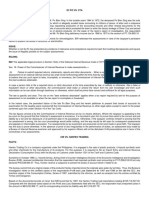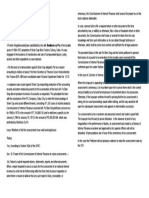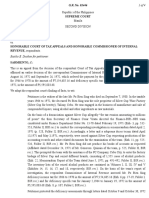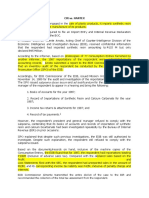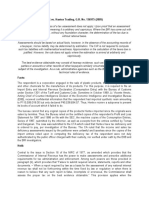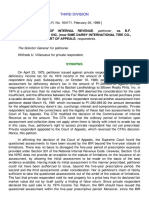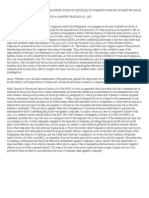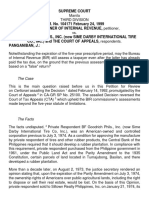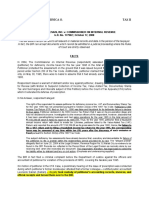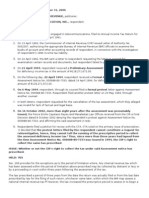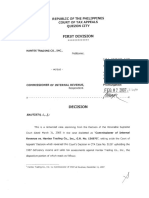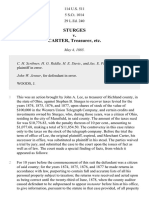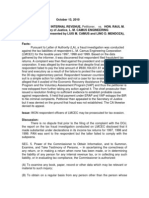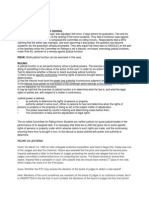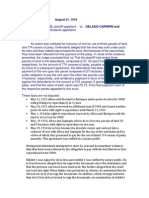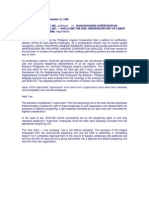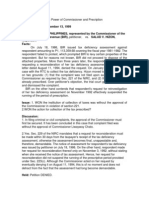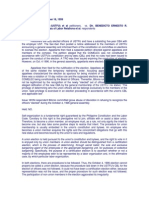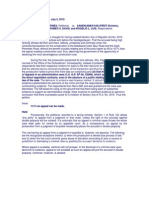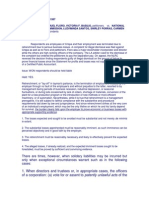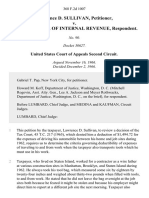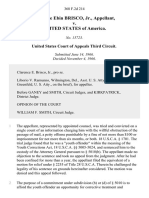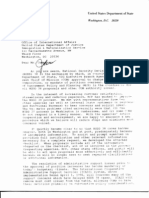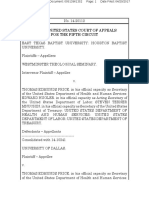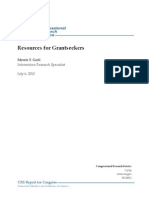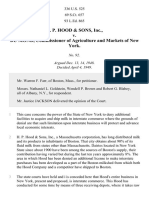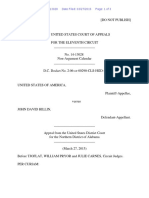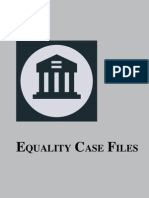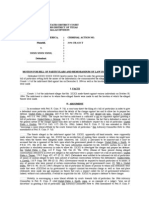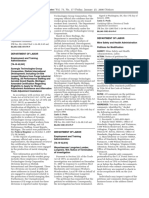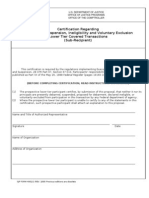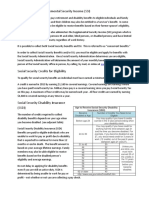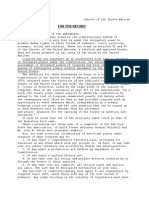Bonifacia Sy Po Vs CTA
Bonifacia Sy Po Vs CTA
Uploaded by
Carl MontemayorCopyright:
Available Formats
Bonifacia Sy Po Vs CTA
Bonifacia Sy Po Vs CTA
Uploaded by
Carl MontemayorOriginal Description:
Original Title
Copyright
Available Formats
Share this document
Did you find this document useful?
Is this content inappropriate?
Copyright:
Available Formats
Bonifacia Sy Po Vs CTA
Bonifacia Sy Po Vs CTA
Uploaded by
Carl MontemayorCopyright:
Available Formats
Applicable Doctrine: Power/Remedy for assessment G.R. No. 81446 August 18, 1988 BONIFACIA SY PO, petitioner, vs.
. HONORABLE COURT OF TAX APPEALS AND HONORABLE COMMISSIONER OF INTERNAL REVENUE, respondents Facts: Petitioner is a widow of the deceased Po Bien who was the sole proprietor of Silver Cup Wine Factory for the taxable years of 1964- 1972. An investigation was conducted against Silver Cup and a letter subpoena was issued against it for examination. The books however were not produced and this prompted the team to seize the books. Later on, a deficiency was assessed. This was then protested but on reinvestigation, the team recommended the reiteration of the assessment in view of the taxpayer's persistent failure to present the books of accounts for examination. Issue: WON the assessment is valid. Discussion: Sec. 16. Power of the Commissioner of Internal Revenue to make assessments. xxx xxx xxx (b) Failure to submit required returns, statements, reports and other documents. When a report required by law as a basis for the assessment of an national internal revenue tax shall not be forthcoming within the time fixed by law or regulation or when there is reason to believe that any such report is false, incomplete, or erroneous, the Commissioner of Internal Revenue shall assess the proper tax on the best evidence obtainable. In case a person fails to file a required return or other document at the time prescribed by law, or willfully or otherwise, files a false or fraudulent return or other documents, the Commissioner shall make or amend the return from his own knowledge and from such information as he can obtain through testimony or otherwise, which shall be prima facie correct and sufficient for all legal purposes. The law is specific and clear. The rule on the "best evidence obtainable" applies when a tax report required by law for the purpose of assessment is not available or when the tax report is incomplete or fraudulent. In the instant case, the persistent failure of the late Po Bien Sing and the herein petitioner to present their books of accounts for examination for the taxable years involved left the Commissioner of Internal Revenue no other legal option except
to resort to the power conferred upon him under Section 16 of the Tax Code. Thus, where the taxpayer appeals to the erroneous assessment, it is incumbent upon him prove there what is the correct and just liability by a full and fair disclosure of all pertinent data in his possession. Otherwise, if the taxpayer confines himself to proving that the tax assessment is wrong, the tax court proceedings would settle nothing, and the way would be left open for subsequent assessments and appeals in interminable succession. Held: Petition DENIED.
You might also like
- Bonifacia Sy Po V CtaDocument2 pagesBonifacia Sy Po V CtaLDNo ratings yet
- Sy Po vs. CTADocument4 pagesSy Po vs. CTAVan John MagallanesNo ratings yet
- Bonifacio Sy Po Vs CTADocument1 pageBonifacio Sy Po Vs CTALouie SalladorNo ratings yet
- Sy Po Vs CTA-DuronDocument1 pageSy Po Vs CTA-DuronkaiaceegeesNo ratings yet
- Sec. 16. Power of The Commissioner of Internal Revenue To Make Assessments. - XXX XXX XXX (B) Failure To Submit Required Returns, StatementsDocument2 pagesSec. 16. Power of The Commissioner of Internal Revenue To Make Assessments. - XXX XXX XXX (B) Failure To Submit Required Returns, StatementsALIYAH MARIE ROJONo ratings yet
- 7 Bonifacia Sy Po vs. CTA (164 SCRA 524)Document10 pages7 Bonifacia Sy Po vs. CTA (164 SCRA 524)Alfred GarciaNo ratings yet
- Cir V PascorDocument4 pagesCir V PascorD De LeonNo ratings yet
- Taxation 2 CasesDocument35 pagesTaxation 2 CasesLatasha PhillipsNo ratings yet
- Fitness Vs CIR - Powers of The CIRDocument3 pagesFitness Vs CIR - Powers of The CIRCarl MontemayorNo ratings yet
- Sy Po Vs CTADocument1 pageSy Po Vs CTALizzy WayNo ratings yet
- Li Yao VS CirDocument2 pagesLi Yao VS CirLou StellarNo ratings yet
- 207-Sy Po v. CTA G.R. No. 81446 August 18, 1988Document4 pages207-Sy Po v. CTA G.R. No. 81446 August 18, 1988Jopan SJNo ratings yet
- Sy Po VS CtaDocument4 pagesSy Po VS CtaMark Cuento LabadNo ratings yet
- Case Digest Remedies Part 1Document23 pagesCase Digest Remedies Part 1Aprille S. AlviarneNo ratings yet
- CIR vs. HANTEXDocument4 pagesCIR vs. HANTEXAnneNo ratings yet
- Tax ReviewerDocument14 pagesTax ReviewerRey Victor GarinNo ratings yet
- GR No. 128315 June 29, 1999Document19 pagesGR No. 128315 June 29, 1999Lj Brazas SortigosaNo ratings yet
- Tax RemDocument19 pagesTax RemLj Brazas SortigosaNo ratings yet
- NESS BY DESIGN INC V. CIR ( From Upper Batch)Document2 pagesNESS BY DESIGN INC V. CIR ( From Upper Batch)nizNo ratings yet
- CIR vs. Hantex Trading, G.R. No. 136975 (2005)Document2 pagesCIR vs. Hantex Trading, G.R. No. 136975 (2005)Mia100% (1)
- Fhw1 01 Cir v. HantexDocument2 pagesFhw1 01 Cir v. HantexFrancis DiazNo ratings yet
- 6 CIR V BF Goodrich PDFDocument9 pages6 CIR V BF Goodrich PDFIsay YasonNo ratings yet
- Fitness by Design V CirDocument3 pagesFitness by Design V Cirleighsiazon100% (1)
- Hantex DigestDocument1 pageHantex DigestmnduqueNo ratings yet
- CIR Vs HantexDocument20 pagesCIR Vs HantexDarrel John SombilonNo ratings yet
- Cir V Hantex Trading Co, Inc. G.R. NO. 136975: March 31, 2005 Callejo, SR., J.: FactsDocument2 pagesCir V Hantex Trading Co, Inc. G.R. NO. 136975: March 31, 2005 Callejo, SR., J.: FactsKate Garo100% (2)
- CIR V BF. GoodrichDocument7 pagesCIR V BF. GoodrichMary Ann Celeste LeuterioNo ratings yet
- Fitness by Design, Inc. v. CIR Case DigestDocument3 pagesFitness by Design, Inc. v. CIR Case DigestCareenNo ratings yet
- CIR Vs Philippine Global CommunicationDocument3 pagesCIR Vs Philippine Global CommunicationMaria Raisa Helga YsaacNo ratings yet
- Requisites of Valid AssessmentDocument63 pagesRequisites of Valid AssessmentHazel Reyes-Alcantara100% (2)
- Taxation Law Ii A.Y. 2018-2019: Case Title: G.R. No/DateDocument2 pagesTaxation Law Ii A.Y. 2018-2019: Case Title: G.R. No/DateCzarina CidNo ratings yet
- CIR Vs Hantex, CTA Division, February 7, 2007Document14 pagesCIR Vs Hantex, CTA Division, February 7, 2007trina tsaiNo ratings yet
- The Solicitor General For Petitioner. Palaez, Adriano & Gregorio For Private RespondentDocument4 pagesThe Solicitor General For Petitioner. Palaez, Adriano & Gregorio For Private RespondentFranky Time MinalangNo ratings yet
- Cir V Hantex Trading Co, Inc. G.R. NO. 136975: March 31, 2005 Callejo, SR., J.: FactsDocument2 pagesCir V Hantex Trading Co, Inc. G.R. NO. 136975: March 31, 2005 Callejo, SR., J.: FactsKate GaroNo ratings yet
- TAX 2 CasesDocument11 pagesTAX 2 CasesJohn Kayle BorjaNo ratings yet
- Sturges v. Carter, 114 U.S. 511 (1885)Document8 pagesSturges v. Carter, 114 U.S. 511 (1885)Scribd Government DocsNo ratings yet
- Tax Review Cases 1Document76 pagesTax Review Cases 1Janice DulotanNo ratings yet
- Commissioner of Internal Revenue vs. Far East Bank & Trust Company (Now Bank of The Philippine Islands) G.R. No. 173854, March 15, 2010 FactsDocument3 pagesCommissioner of Internal Revenue vs. Far East Bank & Trust Company (Now Bank of The Philippine Islands) G.R. No. 173854, March 15, 2010 FactsBrent TorresNo ratings yet
- Tax Remedies NotesDocument16 pagesTax Remedies Notescristiepearl100% (7)
- Tax II (Digest) PDFDocument6 pagesTax II (Digest) PDFSeira AdolfNo ratings yet
- Republic Vs GonzalesDocument2 pagesRepublic Vs GonzalesCarl MontemayorNo ratings yet
- CASE #: 3 TITLE: Fitness by Design, Inc. v. Commissioner of Internal Revenue (CIR), G.R. No. 177982, October 17, TOPIC: Assessing Deficiency TaxesDocument2 pagesCASE #: 3 TITLE: Fitness by Design, Inc. v. Commissioner of Internal Revenue (CIR), G.R. No. 177982, October 17, TOPIC: Assessing Deficiency TaxesRaz Uy BucatcatNo ratings yet
- Republic vs. AblazaDocument2 pagesRepublic vs. AblazaATRNo ratings yet
- Chapter 5 - TAXDocument9 pagesChapter 5 - TAXJkjkMlmlNo ratings yet
- TaxDocument21 pagesTaxSheila ConsulNo ratings yet
- Collector vs. HaygoodDocument5 pagesCollector vs. HaygoodAJ AslaronaNo ratings yet
- Best Evidence Obtainable in The Realm of The Phil. Tax CodeDocument4 pagesBest Evidence Obtainable in The Realm of The Phil. Tax Codehenzencamero100% (1)
- 16.republic V RicarteDocument6 pages16.republic V RicarteJec Luceriaga BiraquitNo ratings yet
- Document 4Document6 pagesDocument 4Ernie B LabradorNo ratings yet
- CIR v. Hantex Trading (Digest)Document4 pagesCIR v. Hantex Trading (Digest)Tini GuanioNo ratings yet
- Part C 1 - CIR Vs Avon Products ManufacturingDocument4 pagesPart C 1 - CIR Vs Avon Products ManufacturingCyruz TuppalNo ratings yet
- Part C 1 - CIR Vs Avon Products ManufacturingDocument4 pagesPart C 1 - CIR Vs Avon Products ManufacturingCyruz Tuppal75% (4)
- 132.fitness by Design Vs CIRDocument6 pages132.fitness by Design Vs CIRClyde KitongNo ratings yet
- Po v. CTADocument1 pagePo v. CTAGain DeeNo ratings yet
- 7-Judy Anne L. Santos vs. People of The Philippines & Bureau of Internal RevenueDocument19 pages7-Judy Anne L. Santos vs. People of The Philippines & Bureau of Internal RevenuefloravielcasternoboplazoNo ratings yet
- Republic of The Philippines Court of Tax Appeals Quezon CityDocument6 pagesRepublic of The Philippines Court of Tax Appeals Quezon CityKevin Patrick Magalona Degayo100% (1)
- BPI v. CIR, G.R. No. 139736Document2 pagesBPI v. CIR, G.R. No. 139736shookt panboi100% (4)
- 19 LimacoDocument4 pages19 LimacoChristiane Marie BajadaNo ratings yet
- Bar Review Companion: Taxation: Anvil Law Books Series, #4From EverandBar Review Companion: Taxation: Anvil Law Books Series, #4No ratings yet
- General Instructions for the Guidance of Post Office Inspectors in the Dominion of CanadaFrom EverandGeneral Instructions for the Guidance of Post Office Inspectors in the Dominion of CanadaNo ratings yet
- Judiciary Santiago Vs Bautista Facts: Sero Elementary SchoolDocument7 pagesJudiciary Santiago Vs Bautista Facts: Sero Elementary SchoolCarl MontemayorNo ratings yet
- Interpleader and Declaratory Relief CasesDocument16 pagesInterpleader and Declaratory Relief CasesCarl MontemayorNo ratings yet
- Preliminary Injunction CASESDocument11 pagesPreliminary Injunction CASESCarl MontemayorNo ratings yet
- Minutes Five PercenterDocument2 pagesMinutes Five PercenterCarl MontemayorNo ratings yet
- Certiorari 64 and 65Document10 pagesCertiorari 64 and 65Carl MontemayorNo ratings yet
- De La Cruz Vs Capinpin - EvidenceDocument2 pagesDe La Cruz Vs Capinpin - EvidenceCarl MontemayorNo ratings yet
- Fitness Vs CIR - Powers of The CIRDocument3 pagesFitness Vs CIR - Powers of The CIRCarl MontemayorNo ratings yet
- Domingo Vs Robles - Presumption of AuthenticityDocument1 pageDomingo Vs Robles - Presumption of AuthenticityCarl MontemayorNo ratings yet
- Barbizon Vs Laguesma - LaborDocument1 pageBarbizon Vs Laguesma - LaborCarl MontemayorNo ratings yet
- Republic Vs HizonDocument1 pageRepublic Vs HizonCarl MontemayorNo ratings yet
- Republic Vs GonzalesDocument2 pagesRepublic Vs GonzalesCarl MontemayorNo ratings yet
- Corpus Vs Tanodbayan - Election JurisdictionDocument1 pageCorpus Vs Tanodbayan - Election JurisdictionCarl MontemayorNo ratings yet
- BPI Vs CASA - Forged SignaturesDocument2 pagesBPI Vs CASA - Forged SignaturesCarl MontemayorNo ratings yet
- CIR Vs Ariete - TaxationDocument2 pagesCIR Vs Ariete - TaxationCarl MontemayorNo ratings yet
- UST Faculty Union Vs Bitonio - Self OrganizationDocument1 pageUST Faculty Union Vs Bitonio - Self OrganizationCarl MontemayorNo ratings yet
- People Vs Sandiganbayan CrimproDocument1 pagePeople Vs Sandiganbayan CrimproCarl MontemayorNo ratings yet
- Prospectus and UnderwriterDocument2 pagesProspectus and UnderwriterCarl MontemayorNo ratings yet
- Buenaseda Vs FlavierDocument1 pageBuenaseda Vs FlavierCarl MontemayorNo ratings yet
- MMDA Vs Garin - Police PowerDocument2 pagesMMDA Vs Garin - Police PowerCarl MontemayorNo ratings yet
- Airline Pilots Vs CIR - LABORDocument2 pagesAirline Pilots Vs CIR - LABORCarl Montemayor100% (1)
- De Jesus Vs COADocument2 pagesDe Jesus Vs COACarl MontemayorNo ratings yet
- Uichico Vs NLRC - Officers LiableDocument2 pagesUichico Vs NLRC - Officers LiableCarl MontemayorNo ratings yet
- Corpus Vs Tanodbayan - Election JurisdictionDocument1 pageCorpus Vs Tanodbayan - Election JurisdictionCarl MontemayorNo ratings yet
- Lawrence D. Sullivan v. Commissioner of Internal Revenue, 368 F.2d 1007, 2d Cir. (1966)Document3 pagesLawrence D. Sullivan v. Commissioner of Internal Revenue, 368 F.2d 1007, 2d Cir. (1966)Scribd Government DocsNo ratings yet
- United States v. James Bullock, 4th Cir. (2013)Document5 pagesUnited States v. James Bullock, 4th Cir. (2013)Scribd Government DocsNo ratings yet
- United States v. Alice M. Blackwell, 935 F.2d 1288, 4th Cir. (1991)Document3 pagesUnited States v. Alice M. Blackwell, 935 F.2d 1288, 4th Cir. (1991)Scribd Government DocsNo ratings yet
- John Anthony Housand v. Maxwell Heiman, 594 F.2d 923, 2d Cir. (1979)Document5 pagesJohn Anthony Housand v. Maxwell Heiman, 594 F.2d 923, 2d Cir. (1979)Scribd Government DocsNo ratings yet
- Clarence Ebin Brisco, Jr. v. United States, 368 F.2d 214, 3rd Cir. (1966)Document3 pagesClarence Ebin Brisco, Jr. v. United States, 368 F.2d 214, 3rd Cir. (1966)Scribd Government DocsNo ratings yet
- DKT +1000+-+supp+ +974 06+motionDocument41 pagesDKT +1000+-+supp+ +974 06+motionAlice ReidNo ratings yet
- United States v. Wazee Uthman, 4th Cir. (1999)Document3 pagesUnited States v. Wazee Uthman, 4th Cir. (1999)Scribd Government DocsNo ratings yet
- T5 B71 Misc Files Re DOS Visa Policy 3 of 3 FDR - Undated DOS Letter To DOJ Re NSDD 38 - Effects and Desired Changes 594Document5 pagesT5 B71 Misc Files Re DOS Visa Policy 3 of 3 FDR - Undated DOS Letter To DOJ Re NSDD 38 - Effects and Desired Changes 5949/11 Document ArchiveNo ratings yet
- Plaintiffs' Status Report (CA5 EBTU) (4.20.17)Document14 pagesPlaintiffs' Status Report (CA5 EBTU) (4.20.17)MSNBCNo ratings yet
- Resources For Grant SeekersDocument12 pagesResources For Grant SeekersRep. Beto O'Rourke100% (2)
- United States v. Mark Roszczipka, 4th Cir. (2012)Document3 pagesUnited States v. Mark Roszczipka, 4th Cir. (2012)Scribd Government DocsNo ratings yet
- HP Hood & Sons, Inc. v. Du Mond, 336 U.S. 525 (1949)Document39 pagesHP Hood & Sons, Inc. v. Du Mond, 336 U.S. 525 (1949)Scribd Government DocsNo ratings yet
- United States v. John David Hillin, 11th Cir. (2015)Document3 pagesUnited States v. John David Hillin, 11th Cir. (2015)Scribd Government DocsNo ratings yet
- United States v. Ollie Pettiford, 4th Cir. (2011)Document3 pagesUnited States v. Ollie Pettiford, 4th Cir. (2011)Scribd Government DocsNo ratings yet
- United States v. Benjamin Calderon, 4th Cir. (2016)Document3 pagesUnited States v. Benjamin Calderon, 4th Cir. (2016)Scribd Government DocsNo ratings yet
- 1:14-cv-01180 #61Document7 pages1:14-cv-01180 #61Equality Case FilesNo ratings yet
- HB 5609 - Exempting Contributions To GSIS, SSS, Phil Health, Pag-Ibig From TaxationDocument4 pagesHB 5609 - Exempting Contributions To GSIS, SSS, Phil Health, Pag-Ibig From TaxationBayan Muna Party-listNo ratings yet
- United States v. Raymond Eugene Moss, JR., Also Known As - Sloss, 149 F.3d 1192, 10th Cir. (1998)Document2 pagesUnited States v. Raymond Eugene Moss, JR., Also Known As - Sloss, 149 F.3d 1192, 10th Cir. (1998)Scribd Government DocsNo ratings yet
- Bill of ParticularsDocument3 pagesBill of Particularslegalmatters100% (7)
- Notice: Weyerhaeuser Longview Lumber, Longview, Washington Termination of InvestigationDocument1 pageNotice: Weyerhaeuser Longview Lumber, Longview, Washington Termination of InvestigationJustia.comNo ratings yet
- Federal Debarment CertificationDocument2 pagesFederal Debarment CertificationValerie F. LeonardNo ratings yet
- Social Security & Supplemental Security Income (SSI) : WWW - Ssa.govDocument5 pagesSocial Security & Supplemental Security Income (SSI) : WWW - Ssa.govanon_26882226100% (2)
- Wessel v. Glendening, 4th Cir. (2002)Document28 pagesWessel v. Glendening, 4th Cir. (2002)Scribd Government DocsNo ratings yet
- Fy 16 House FSGG Letter RogersDocument6 pagesFy 16 House FSGG Letter RogersSam GustinNo ratings yet
- United States v. Salvador Torres, 4th Cir. (2014)Document5 pagesUnited States v. Salvador Torres, 4th Cir. (2014)Scribd Government DocsNo ratings yet
- United States v. Rashia Wilson, 11th Cir. (2014)Document7 pagesUnited States v. Rashia Wilson, 11th Cir. (2014)Scribd Government DocsNo ratings yet
- Thomas v. Vuksta, 3rd Cir. (2012)Document4 pagesThomas v. Vuksta, 3rd Cir. (2012)Scribd Government DocsNo ratings yet
- United States Court of Appeals, Second Circuit.: No. 894, Docket 78-6011Document15 pagesUnited States Court of Appeals, Second Circuit.: No. 894, Docket 78-6011Scribd Government DocsNo ratings yet
- Congressional Record Page A3220, Statement of Carl B. RixDocument2 pagesCongressional Record Page A3220, Statement of Carl B. RixSharif 91288% (8)
- EB-5 ICE Memo & Grassley LetterDocument10 pagesEB-5 ICE Memo & Grassley LetterStephen LoiaconiNo ratings yet

